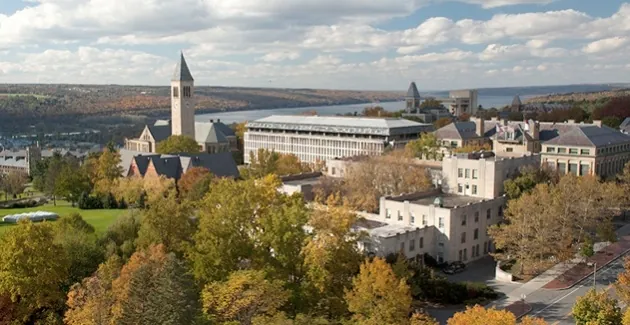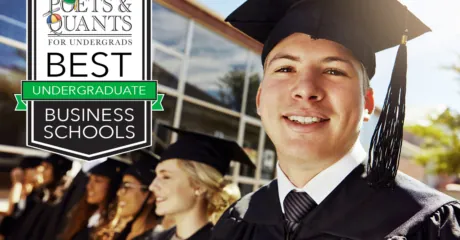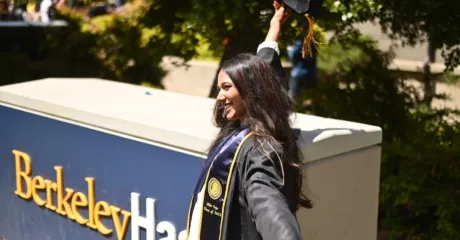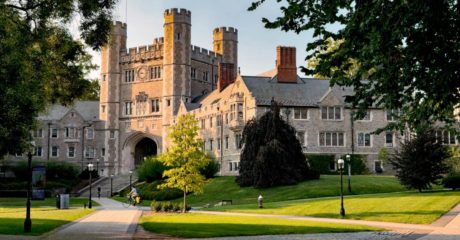Cornell University’s SC Johnson College of Business, which houses the Dyson School of Applied Economics and Management, has proven to firmly be a top-20 school as it has placed in the top 20 each year it’s participated in the Poets&Quants rankings. Cornell is also one of just two Ivy League schools that offers an undergraduate business degree.
In this year’s 2023 rankings, Cornell held on to their place at No. 6 – up 10 places from No. 16 in the 2022 rankings. Of the three methodological categories, they ranked highest in the Admissions category at No. 3.
Cornell’s undergraduate business education is truly a unique experience. This year’s acceptance rate was 4.79%, just slightly up from last year’s 4.17%, making them the second-most selective B-School in this year’s rankings.
Internship stats rose, with an impressive 100% of the Class of 2023 landing a business-focused internship before graduating – up nearly ten percent from last year’s 90.20%. As far as employment goes, 95.25% of the Class of 2023 secured full-time employment within three months of graduation, down just slightly from 97.55% for last year’s class.
Of those with full-time employment, the average starting salary was $98,066 – the third highest of the ranked schools this year.
UNIQUE CONVERGENCE WITH COLLEGE OF AGRICULTURAL AND LIFE SCIENCES
All Cornell business students must complete a group of core courses, a set of liberal arts courses, and pick at least one of 13 concentrations. An aspect that sets Dyson’s curriculum apart from others is it is technically a part of both the College of Business and the College of Agricultural and Life Sciences.
“Because of the Dyson School’s location in both Cornell’s SC Johnson College of Business and College of Agriculture and Life Sciences, students can easily combine their major with a concentration or double major in the life sciences, environmental sciences, agricultural sciences, or applied social sciences,” the school says.
“Dyson students commonly major or minor in a biological science, information science, communication, environmental and sustainability sciences, biometry and statistics, animal science, or food science. Such unbounded exposure keeps Dyson School students one-step ahead of the competition by preparing them to lead in a future where the sciences, social sciences, and the arts will increasingly converge.”
This unique convergence is seen in the Food Marketing Fellows honors program.
“Dyson has so many opportunities for experiential learning. I participated in the Food Marketing Fellows program that entailed visits to different businesses to learn from the owners/managers how their business works,” one 2018 alum tells P&Q. “The program concludes with an international trip to learn about the food industry in a foreign country. From this program, one broadens their perspective by analyzing the food industries of two different countries.”
A FOCUS ON SOFT SKILLS
The school says its unique aspect is a focus on soft skills to go along with more traditional business skills.
“Dyson students gain excellent analytical business skills but also develop the self-insight, flexibility, and empathy to enable them to chart a productive course in a rapidly changing world,” the school said in the school survey portion of the ranking. “This is fundamental to Dyson’s mission for undergraduate education. Not content with providing a strong pathway to a student’s coveted first job, we strive to educate for the long haul: our graduates can only make a better world if they are confident and creative about their own place in that world.”
Alumni say:
“My senior spring, I did a senior project for a professor that specialized in the study of sports teams as organizations. The project I did focused on creating a model that would predict the NCAA tournament using metrics you deemed most important to prediction. Getting into the data has helped me in my career in sports management to date and I would say most people did not have a chance like this to combine their passion with important hard skills.”
“I was part of Dyson’s “Grand Challenges” project that focused on addressing the UN’s Sustainable Development Goals. I learned valuable skills in teamwork, leadership, and project management, and I felt like my work aligned with my values and had a meaningful impact.”
“I was a part of the Dyson School’s Undergraduate Teaching Assistant Program and was a part of the teaching team for two course – one was a spreadsheet modeling course and the other was an advanced economic argumentation and writing course where students participated in discussion / debates and wrote papers on a variety of controversial economic subjects. I received the Best Undergraduate Teaching Assistance award for my work. This experience was important to me because it allowed me to understand how to explain complex topics in addition to giving me an opportunity to hone my leadership and teamwork skills.”
“As a black man from a destitute background, my life goal has been to understand how to account for resources for impoverished communities. My experience with the practicum showed me the annual resource distribution process we facilitate in societies and taught me the language to begin my initial engagement of understanding how policy, money and people come together. Being a part of the program has cemented an unchanging understanding of the structure of society which has brought me much success while also giving me a practice of tax filing and volunteering.”
“As part of my Master of Professional Studies in Behavioral Finance after attaining my undergraduate degree, I completed a research study about how Millennials use passive vs. active investing. It was very fulfilling to choose my own research, send out a survey, and perform analysis on the results for my final paper.”










